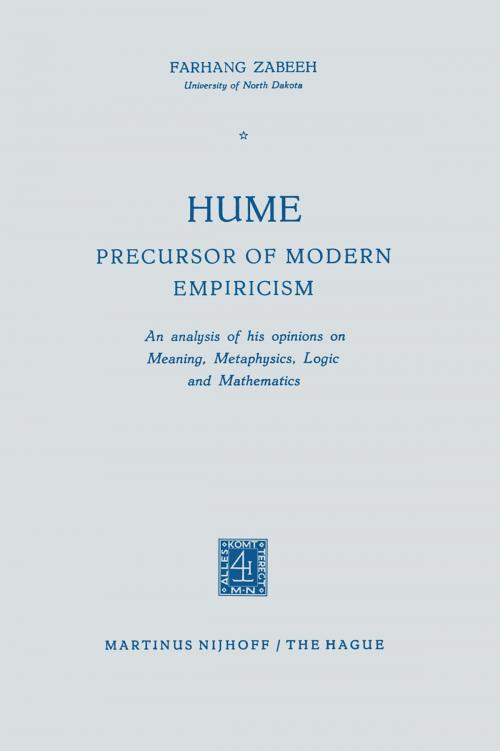Hume Precursor of Modern Empiricism
An analysis of his opinions on Meaning, Metaphysics, Logic and Mathematics
Nonfiction, Religion & Spirituality, Philosophy, Metaphysics| Author: | Farhang Zabeeh | ISBN: | 9789401191944 |
| Publisher: | Springer Netherlands | Publication: | December 6, 2012 |
| Imprint: | Springer | Language: | English |
| Author: | Farhang Zabeeh |
| ISBN: | 9789401191944 |
| Publisher: | Springer Netherlands |
| Publication: | December 6, 2012 |
| Imprint: | Springer |
| Language: | English |
David Hume is the most influential precursor of modern empiri cism. By modern empiricism, I intend a belief that all cognitive conflicts can be resolved, in principle, by either appeal to matters offact, via scientific procedure, or by appeal to some sets of natural or conventional standards, whether linguistic, mathematical, aes thetic or political. This belief itself is a consequent of an old appre hension that all synthetic knowledge is based on experience, and that the rest can be reduced to a set of self-evident truths. In this broad sense, Modern Empiricism encompasses classes, such as Logi cal Empiricism, Logical Atomism and Philosophical Analysis, and unique individuals such as Russell and Moore. It excludes, thereby, the present day continental philosophies, such as Thomism, Exist entialism, and Dialectical Materialism. Modern empiricists, to be sure, are influenced by many other phi losophers. Locke, Berkeley, and Mill, among the classical empiri cists, and Leibniz and Kant, among the rationalists (the former especially on the logico-mathematical side) in one way or other are responsible for the appearance of empiricism in its new form. But none of them were as influential as Hume. This, by itself is not news. Weinberg, in his well-known book, An Examination of Logical Positivism, observes that: Many, if not all, of the principal doctrines of contemporary positivism derive from Hume.
David Hume is the most influential precursor of modern empiri cism. By modern empiricism, I intend a belief that all cognitive conflicts can be resolved, in principle, by either appeal to matters offact, via scientific procedure, or by appeal to some sets of natural or conventional standards, whether linguistic, mathematical, aes thetic or political. This belief itself is a consequent of an old appre hension that all synthetic knowledge is based on experience, and that the rest can be reduced to a set of self-evident truths. In this broad sense, Modern Empiricism encompasses classes, such as Logi cal Empiricism, Logical Atomism and Philosophical Analysis, and unique individuals such as Russell and Moore. It excludes, thereby, the present day continental philosophies, such as Thomism, Exist entialism, and Dialectical Materialism. Modern empiricists, to be sure, are influenced by many other phi losophers. Locke, Berkeley, and Mill, among the classical empiri cists, and Leibniz and Kant, among the rationalists (the former especially on the logico-mathematical side) in one way or other are responsible for the appearance of empiricism in its new form. But none of them were as influential as Hume. This, by itself is not news. Weinberg, in his well-known book, An Examination of Logical Positivism, observes that: Many, if not all, of the principal doctrines of contemporary positivism derive from Hume.















